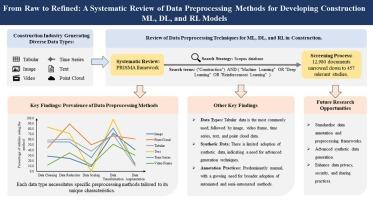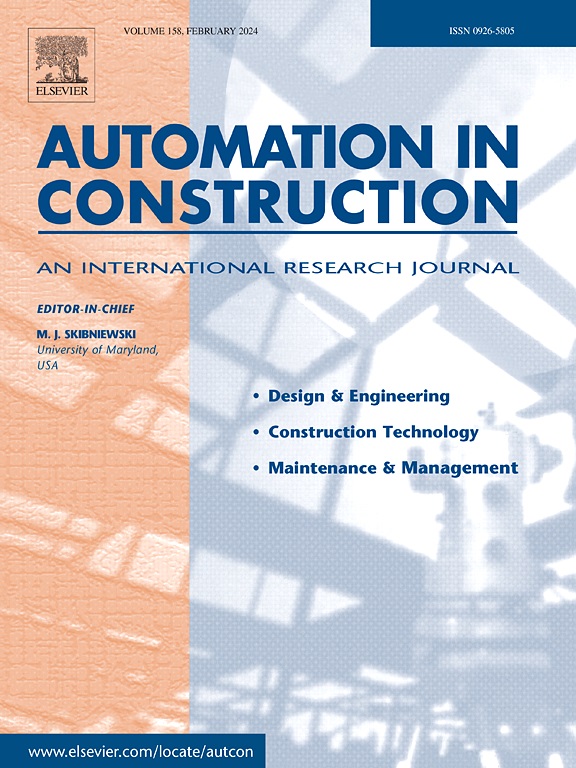从原始到精炼:构建机器学习 (ML)、深度学习 (DL) 和强化学习 (RL) 模型的数据预处理
IF 9.6
1区 工程技术
Q1 CONSTRUCTION & BUILDING TECHNOLOGY
引用次数: 0
摘要
随着预测模型在建筑领域的使用迅速增加,对原始建筑数据进行预处理的需求也变得更加迫切。本系统综述研究了建筑领域机器学习(ML)、深度学习(DL)和强化学习(RL)模型的数据预处理技术。通过对 457 项研究的综合分析,考察了六种数据类型(即表格、图像、视频帧、时间序列、文本和点云)的普遍性及其各自的预处理方法。主要研究结果表明,数据转换、清理、缩减、增强和缩放是基本的预处理类别,在不同数据类型中的应用各不相同。论文强调了知识差距,包括合成数据采用有限、缺乏标准化注释实践、缺乏全面的预处理框架以及对自动标记的需求。此外,还讨论了有关数据隐私、安全、共享和管理实践的重要考虑因素。综述强调了强大的数据预处理在建立可靠的预测模型中的关键作用。本文章由计算机程序翻译,如有差异,请以英文原文为准。

From raw to refined: Data preprocessing for construction machine learning (ML), deep learning (DL), and reinforcement learning (RL) models
As the use of predictive models in construction rapidly increases, the need for preprocessing raw construction data has become more critical. This systematic review investigates data preprocessing techniques for machine learning (ML), deep learning (DL), and reinforcement learning (RL) models in the construction domain. Through a comprehensive analysis of 457 studies, the prevalence of six data types (i.e., tabular, image, video frame, time series, text, and point cloud) and their respective preprocessing methods are examined. Key findings reveal data transformation, cleaning, reduction, augmentation, and scaling as fundamental preprocessing categories, with applications varying across data types. The paper highlights knowledge gaps, including limited synthetic data adoption, lack of standardized annotation practices, absence of comprehensive preprocessing frameworks, and need for automated labeling. Furthermore, critical considerations regarding data privacy, security, sharing, and management practices are discussed. The review underscores the pivotal role of robust data preprocessing in enabling reliable predictive models.
求助全文
通过发布文献求助,成功后即可免费获取论文全文。
去求助
来源期刊

Automation in Construction
工程技术-工程:土木
CiteScore
19.20
自引率
16.50%
发文量
563
审稿时长
8.5 months
期刊介绍:
Automation in Construction is an international journal that focuses on publishing original research papers related to the use of Information Technologies in various aspects of the construction industry. The journal covers topics such as design, engineering, construction technologies, and the maintenance and management of constructed facilities.
The scope of Automation in Construction is extensive and covers all stages of the construction life cycle. This includes initial planning and design, construction of the facility, operation and maintenance, as well as the eventual dismantling and recycling of buildings and engineering structures.
 求助内容:
求助内容: 应助结果提醒方式:
应助结果提醒方式:


